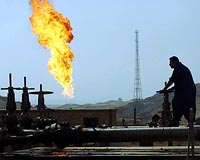 |
Tripoli, Libya (UPI) Oct 8, 2009 The Libyan government has replaced the head of the state oil company in a move that industry analysts say indicates Col. Moammar Gadhafi's regime is turning its back on foreign oil companies that have been clamoring to return to the long-shuttered North African country. Ali Mohammed Saleh was appointed director of the National oil Corp. by the General People's Committee, the Libyan equivalent of a cabinet, on Sept. 29. That was seen as a victory for the conservative bloc in government, which opposes reforms that would open up Africa's largest proven oil reserves to international oil firms and give them substantial returns for major investments to upgrade the country's rundown oil industry. The conservatives favor a more gradual approach, with stiff contract terms that limit returns for international companies, an approach the companies consider far too harsh. Saleh, NOC's former managing director, replaced Shukri Ghanem, a former prime minister and widely considered to be a reformer. Ghanem was forced to step down after repeated clashes with Prime Minister Baghdadi al-Mahmoudi, an ardent conservative. Ghanem is considered close to Seif al-Islam, the reform-minded son of Gadhafi who has for some been seen as his political heir and likely successor. It was not clear whether the departure of Ghanem from such a key economic post signals that the hard-line bloc in the regime is squeezing Seif al-Islam out. But there were indications that Gadhafi is having to bend toward the hard-liners to avert any political upheaval. The direction that NOC policy was taking became evident when it forced international companies to accept lower shares of oil production from their concession areas. Many of these companies had operated virtually without restraint in Libya from 1957, when oil was first found there, until 1973 when Gadhafi seized power in 1969 and nationalized the oil sector. The last of the companies was thrown out in 1985-86 after U.S. warplanes bombed Tripoli and Benghazi. The United States decreed an embargo on dealings with Libya in 1986. The United Nations imposed economic sanctions in 1992 after Libya was accused of the 1988 bombing of a Pan Am jumbo jet over Scotland that killed 270 people. The international companies had been lining up to get back into Libya since those sanctions were lifted once Gadhafi renounced terrorism and abandoned a clandestine nuclear arms program in 2003. More than 120 registered bids. They included ChevronTexaco and Occidental Petroleum Corp. of the United States. However, only a fraction of these have secured licenses. All told, some 40 foreign oil companies are currently working in Libya. On Jan. 29 the Libyan government ratified a $900 million natural gas exploration deal with British energy giant BP, signed May 29, 2007, the first significant Western project in Libya since Gadhafi reopened the country to the West in late 2003. It allows BP to drill 17 exploration wells across an area of 13.3 million acres in the Ghadames region and in the offshore Sirta basin. If successful, BP could transform Libya, already a major oil exporter, into an energy superpower and one of the top gas exporters to energy-hungry Europe. But meantime, Tripoli is desperate to boost production from its current level of 1.7 million barrels of oil per day, well below potential, to 3 million per day within five years. But the foreign companies in Libya have met with disappointing drilling results. Probably as a consequence, Libya announced in September it was launching a $10 billion investment program to boost production at 24 fields -- but restricted to Libyan companies and those foreign outfits already operating in the country. This restrictive new policy resulted in the scrapping of the Supreme Council for Oil and Gas Affairs, a government body supported by Ghanem, and the creation of a new agency, the Supreme Council for Energy Affairs, that will regulate the energy sector. Premier Mahmoudi backs the new body, which is aligned with another of Gadhafi's sons, Mutassim, who has been amassing political clout in recent years in apparent competition with Seif al-Islam. Share This Article With Planet Earth
Related Links Powering The World in the 21st Century at Energy-Daily.com
 Iraq agrees terms with BP and China's CNPC on oil deal
Iraq agrees terms with BP and China's CNPC on oil dealBaghdad (AFP) Oct 8, 2009 Iraq's oil ministry said on Thursday it had agreed commercial terms for a key deal with Britain's BP and China's CNPC International to almost triple production at a giant southern oilfield. Officials from Iraq's state-owned South Oil Company and the two oil majors have put their initials to the deal, paving the way for final approval, ministry spokesman Assem Jihad told AFP. ... read more |
|
| The content herein, unless otherwise known to be public domain, are Copyright 1995-2009 - SpaceDaily. AFP and UPI Wire Stories are copyright Agence France-Presse and United Press International. ESA Portal Reports are copyright European Space Agency. All NASA sourced material is public domain. Additional copyrights may apply in whole or part to other bona fide parties. Advertising does not imply endorsement,agreement or approval of any opinions, statements or information provided by SpaceDaily on any Web page published or hosted by SpaceDaily. Privacy Statement |